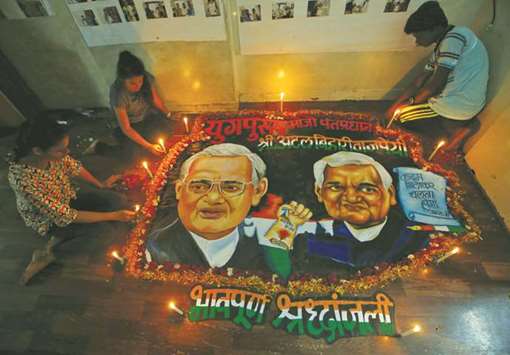Former prime minister Atal Bihari Vajpayee, whose politics of moderation in a hardline party propelled the Bharatiya Janata Party to power for the first time in the 1990s, died yesterday after a long illness.
The 93-year-old leader, who faded from public life for more than a decade following health complications and was admitted to the All India Institute of Medical Sciences (AIIMS) with urinary tract infection on June 11, passes away at 5.05pm, the hospital said in a statement.
“It is with profound grief that we inform about the sad demise of former prime minister Atal Bihari Vajpayee,” the statement said.
“Unfortunately, his condition deteriorated over the last 36 hours and he was put on life support system. Despite the best of efforts, we have lost him today.”
Vajpayee, a diabetic, was undergoing treatment. He was said to be stable for the last nine weeks but his health suffered a setback on Sunday and worsened on Wednesday.
That things were getting worse could be gleaned from the fact that Prime Minister Narendra Modi made two visits to AIIMS in the last two days.
Rich tributes poured from across the political spectrum for Vajpayee who had the reputation of having no enemies in politics.
Modi described the passing away of Vajpayee as “the end of an era” and said every Indian and the BJP worker would continue to be guided by his vision.
President Ram Nath Kovind said Vajpayee was a “true Indian statesman”.
“His leadership, foresight, maturity and eloquence put him in a league of his own.”
Congress president Rahul Gandhi said Vajpayee was loved and respected by millions. “Today, India lost a great son.”
Earlier, as news of deterioration of his health spread, national leaders, including Vice President M Venkaiah Naidu, BJP president Amit Shah, party veterans L K Advani and Murli Manohar Joshi, and Home Minister Rajnath Singh, cabinet ministers, chief ministers and opposition leaders including Gandhi and Mamata Banerjee visited the hospital during the day.
The body was taken to Vajpayee’s house on Krishna Menon Marg in Delhi for the public to pay last respects.
The former prime minister, whose birthday on December 25 is celebrated as Good Governance Day, was honoured with the Bharat Ratna in 2014 at his home.
Vajpayee, whose more than six-year term was marked by peace initiative with Pakistan and the 1998 Pokhran nuclear test that invited US sanctions, was a bachelor and leaves behind a foster family.
Though his long-time associate Advani was credited with the rise of the BJP from the 1980s on the Ayodhya temple issue with his hardline politics, it was Vajpayee’s moderate stance that took the party close to power.
He was the prime minister for 13 days in mid-1996 at the head of the first short-lived BJP government. He was forced to resign ahead of a confidence vote as he failed to muster the numbers.
However, Vajpayee again became the prime minister in March 1998 with improved numbers and new allies like the Telugu Deasam Party, the All India Anna Dravida Munnetra Kazhagam, the National Conference and the Samta Party.
But his government fell 13 months later losing by one vote in the confidence motion after AIADMK headed by the late J Jayalalithaa withdrew support to the BJP.

Students place candles around a painting featuring Atal Bihari Vajpayee to pay him homage, in Mumbai yesterday.
